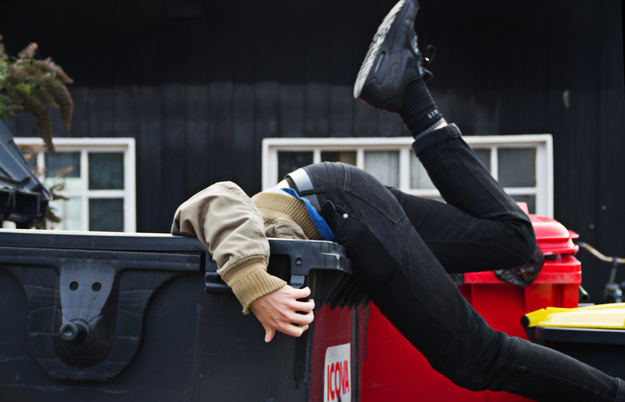It is not well explained in the movie what kind of apocalypse happened in “The Road”. Was it a drastic climate change? Pandemic disease? Or maybe geomagnetic reversal? We can’t be sure.
In a way, “The Road” becomes a symbol for all kind Doomsday scenarios. It is not the cause of an apocalypse that it is most important in the movie, but rather how we, as a humanity, will react to it. How can hunger affect our culture and personality? How far can we go in the fight for survival?
The world presented in the movie is an empty land with steadily decreasing temperature. It seems that no life except humans survived the apocalypse (even no cockroaches!). There are no crops, no animals, no working amenities. Those who survived rely on canned and lyophilized goods, insects or anything else they find it possible to eat. Others, in search of necessary proteins and nutrients, go even further and they hunt for the one remaining species, that is…… humans.
However, our discussion group thought the gloomy image of the world shown in the movie, is not very realistic. We don’t believe that we can run out of all food options so fast. Maybe, there will be panic in the beginning and sources will be limited, but finally, we would find a solutions to produce enough food. Nowadays, many scientists work already on alternative techniques of farming and producing food. The London-based company Growing Underground proves that , with use of LED lights and newest hydroponic technology, it is possible to produces fresh foods in subterranean farms. The famous French cook Hervé This has recently shaken the world of gastronomy with his scientific and revolutionary methods of cooking. This’ Note-by-note cuisine promotes the idea of creating dishes from pure molecular compounds, like e.g. amino acid, soloton or glucose.
There are also many existing groups of preppers who try to prepare themselves for all kinds of possible Doomsday scenarios. Some extreme survivalists dedicate their whole life to collecting of necessary supplies, and as our discussion group think, forget living and enjoying their everyday life. Maybe, the way we can prepare for challenges of tomorrow is to work as a community, rather than individual; and to focus on collecting knowledge, rather than items. Modern world requires new skills, like coding or self-managing, and many millennials and post-millennials have no connection and understanding of basic engineering or farming, the two things that can be crucial for survival in more extreme conditions.
However, what most shocked all of us in “The Road” were the scenes that included cannibalism. Hunger can have a huge impact on people, and cannibalistic events are not so uncommon in the history as we may think. There are recorded cases of cannibalism in place of plane crashes or among shipwrecked survivors. Some women are still engaged in the ritual of eating their own placenta after childbirth to provide their body with necessary nutrients. The tribes of Vanuatu were forced to develop cannibalistic traditions due to lack of protein sources on the islands…. And although, it is a taboo among people, cannibalistic practices are surprisingly common in the animal kingdom. Male lions kill male cubs to take over a pride of lionesses, chickens eat their eggs if they don’t have enough calcium, and famous praying manties eat their male mates after sex…
In “The Road”, the act of cannibalism and killing became a symbol and line between “bad and good guys”. In most cultures, these acts are prohibited by religion or other moral codes. For animals, the need and survival always comes first. Is it also for a human kind? Are we nothing else than well-fed animals? Or are we able to set ethical boundaries? Are we able to fight for the world with rules that would be worth teaching to our kids?
